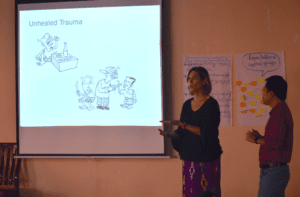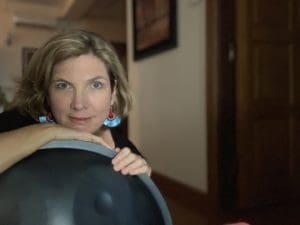Non-Violent Communication in Myanmar. Member Spotlight: Joanne Lauterjung
Joanne Lauterjung is an experienced peacebuilder, communications consultant and trained mediator specializing in dialogue training and facilitation. She completed her mediation training in 2010 and was halfway through her MA in Conflict Transformation at Eastern Mennonite University when she moved to Myanmar in 2011, and began her peacebuilding work. For the last ten years, she has been working to facilitate spaces for non-violent communication in Myanmar.
‘Courageous Conversations About Race’
 Joanne first learned of MBBI while working with Ginny Morrison, an MBBI member, a colleague at the Karuna Center for Peacebuilding. Joanne joined MBBI two years ago and is particularly interested in the voluntary aspect, and wants to offer a peacebuilding perspective learned from experiences beyond mediation. In addition to facilitating dialogue, she develops curriculum, trains, and teaches.
Joanne first learned of MBBI while working with Ginny Morrison, an MBBI member, a colleague at the Karuna Center for Peacebuilding. Joanne joined MBBI two years ago and is particularly interested in the voluntary aspect, and wants to offer a peacebuilding perspective learned from experiences beyond mediation. In addition to facilitating dialogue, she develops curriculum, trains, and teaches.
Growing up the youngest in a large family, she developed an acute sense of justice early on in life – and grew up with a desire to develop skills in responding to conflict. Her undergraduate studies were in the visual arts, a practice that developed her sensitivity and multi-sensory awareness of how we communicate and navigate the world around us. This has helped her peacebuilding practice by more deeply understanding the role of communication in relationships, and how poor communication can easily lead to conflict.
Before her mediation training, Joanne worked as a communications consultant for more than 20 years and was active in community organizing. In 2004 she participated in a program called ‘Courageous Conversations About Race’, a program that promotes dialogue on race in the U.S. This experience had a lasting impression on her and motivated a career change that aligned with her values. Joanne went back to school at age 47 to study Conflict Transformation at EMU’s Center for Justice and Peacebuilding. She believes it is important for white people to talk about race and racism saying, ‘As white people, we haven’t had to talk about race and therefore lack the language or the skills to talk about it’.
Mediation and Dialogue
 During the past eight years, Joanne’s career has focused on dialogue more than mediation, but she believes, ‘Mediation and dialogue are similar in terms of listening skills, and honoring different narratives.’ Joanne appreciates that dialogue work gives her the freedom to be creative in a way that is different from more formal forms of mediation. For example, using creative dialogue structures and using arts-based facilitation to build trust and allow for a deeper conversation. Since moving to Myanmar in 2011, Joanne has integrated lessons and concepts from her communications work, but she notes that it wasn’t always easy to make that change. Changing careers right before moving to another country meant rebuilding networks and gaining the necessary cultural understanding. She remembers her first peacebuilding job with an INGO and the way she struggled to understand cultural norms, but says, ‘There’s no shortcut for getting experience’, and through patience and a commitment to deep listening, she grew and learned from the experience and has now worked successfully with numerous organizations.
During the past eight years, Joanne’s career has focused on dialogue more than mediation, but she believes, ‘Mediation and dialogue are similar in terms of listening skills, and honoring different narratives.’ Joanne appreciates that dialogue work gives her the freedom to be creative in a way that is different from more formal forms of mediation. For example, using creative dialogue structures and using arts-based facilitation to build trust and allow for a deeper conversation. Since moving to Myanmar in 2011, Joanne has integrated lessons and concepts from her communications work, but she notes that it wasn’t always easy to make that change. Changing careers right before moving to another country meant rebuilding networks and gaining the necessary cultural understanding. She remembers her first peacebuilding job with an INGO and the way she struggled to understand cultural norms, but says, ‘There’s no shortcut for getting experience’, and through patience and a commitment to deep listening, she grew and learned from the experience and has now worked successfully with numerous organizations.
 When asked about some of the most important lessons she has taken from her time in Myanmar, particularly as a Westerner working in a developing country, she notes, ‘We are at a crucial point in history – especially those of us from the Western world. We need to listen deeply. We might think we have the answers, but what’s needed are bottom-up, indigenous-led solutions. Communities MUST be engaged to solve their own problems in ways that work best for them’. In peacebuilding, where we are working with certain, entrenched power structures, and it is vital to understand those structures and recognize, ‘We all have some kind of privilege…even holding space to disagree is a privilege.’ Joanne brings this awareness into her work.
When asked about some of the most important lessons she has taken from her time in Myanmar, particularly as a Westerner working in a developing country, she notes, ‘We are at a crucial point in history – especially those of us from the Western world. We need to listen deeply. We might think we have the answers, but what’s needed are bottom-up, indigenous-led solutions. Communities MUST be engaged to solve their own problems in ways that work best for them’. In peacebuilding, where we are working with certain, entrenched power structures, and it is vital to understand those structures and recognize, ‘We all have some kind of privilege…even holding space to disagree is a privilege.’ Joanne brings this awareness into her work.
Overcoming Cultural Differences in Southeast Asia
One of the many gifts Joanne has received from her peacebuilding work is a greater appreciation of Southeast Asian culture. She has witnessed incredible resilience and creativity in overcoming diversity and injustice. And while the concept of restorative justice is largely unknown, she believes there are cultural responses to conflict that could be considered restorative practices. ‘Different ethnic groups have traditions of dialogue and ways of coming together. A lot of what I’ve learned in Myanmar comes from letting go of a very Western idea of efficiency, a more goal-oriented, linear approach, and embracing more adaptive processes to focus on prioritizing relationships over outcomes.’ She believes this creates an environment that is conducive for people to make non-violent choices.
 As a musician, and with a background in the arts, Joanne has always believed in the power of culture to build bridges between diverse communities. She studied Creative Facilitation in 2008 with Power of Hope, a youth empowerment program, and could see how these techniques could be applied with adults as a low-risk way to engage in dialogue. After completing a Training of Trainers course with Musicians Without Borders in 2017, and weaving in her own studies on the psychosocial benefits of music, she launched SonicBloom. SonicBloom combines evidence-based research and community building with music to support social change and wellbeing through program and project design, curriculum development, training, monitoring and evaluation, and research. on using evidence-based practices. Joanne is particularly excited about her new blog series, Singers on the Front Lines, which looks at how singing is being used to support wellbeing with vulnerable populations such as refugees and prison inmates, particularly during these challenging times in dealing with the COVID-19 pandemic.
As a musician, and with a background in the arts, Joanne has always believed in the power of culture to build bridges between diverse communities. She studied Creative Facilitation in 2008 with Power of Hope, a youth empowerment program, and could see how these techniques could be applied with adults as a low-risk way to engage in dialogue. After completing a Training of Trainers course with Musicians Without Borders in 2017, and weaving in her own studies on the psychosocial benefits of music, she launched SonicBloom. SonicBloom combines evidence-based research and community building with music to support social change and wellbeing through program and project design, curriculum development, training, monitoring and evaluation, and research. on using evidence-based practices. Joanne is particularly excited about her new blog series, Singers on the Front Lines, which looks at how singing is being used to support wellbeing with vulnerable populations such as refugees and prison inmates, particularly during these challenging times in dealing with the COVID-19 pandemic.
Much of Joanne’s work in Myanmar as focused on helping local colleagues design meaningful and creative community dialogue experiences. She has a passion for this work, and values the role of reflection, taking time to understand both the big picture and the important details of any situation.
Article by Lizzy Nestor, MBBI Writer
